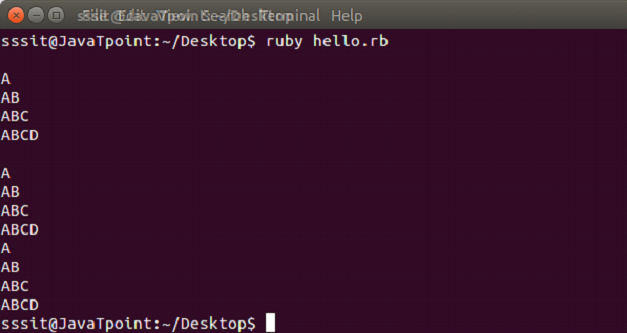Ruby string object holds and manipulates an arbitary sequence of bytes, typically representing characters. They are created using String::new or as literals.
Quotes
Ruby string literals are enclosed within single and double quotes.
Example:
#!/usr/bin/ruby
puts 'Hello everyone'
puts "Hello everyone"Output:

Accessing string elements
You can access Ruby string elements in different parts with the help of square brackets []. Within square brackets write the index or string.
Example:
#!/usr/bin/ruby
msg = "This tutorial is from JavaTpoint."
puts msg["JavaTpoint"]
puts msg["tutorial"]
puts msg[0]
puts msg[0, 2]
puts msg[0..19]
puts msg[0, msg.length]
puts msg[-3]Output:

Multiline string
Writing multiline string is very simple in Ruby language. We will show three ways to print multi line string.
- String can be written within double quotes.
- The % character is used and string is enclosed within / character.
- In heredoc syntax, we use << and string is enclosed within word STRING.
Example:
- puts "
- A
- AB
- ABC
- ABCD"
-
- puts %/
- A
- AB
- ABC
- ABCD/
-
- puts <<STRING
- A
- AB
- ABC
- ABCD
- STRING
Output:

Variable Interpolation
Ruby variable interpolation is replacing variables with values inside string literals. The variable name is put between #{ and } characters inside string literal.
Example:
#!/usr/bin/ruby
country = "India"
capital = "New Delhi"
puts "#{capital} is the capital of #{country}."Output:

Concatenating Strings
Ruby concatenating string implies creating one string from multiple strings. You can join more than one string to form a single string by concatenating them.
There are four ways to concatenate Ruby strings into single string:
- Using plus sign in between strings.
- Using a single space in between strings.
- Using << sign in between strings.
- Using concat method in between strings.
Example:
#!/usr/bin/ruby
string = "This is Ruby Tutorial" + " from JavaTpoint." + " Wish you all good luck."
puts string
string = "This is Ruby Tutorial" " from JavaTpoint." " Wish you all good luck."
puts string
string = "This is Ruby Tutorial" << " from JavaTpoint." << " Wish you all good luck."
puts string
string = "This is Ruby Tutorial".concat(" from JavaTpoint.").concat(" Wish you all good luck.")
puts stringOutput:

Freezing Strings
In most programming languages strings are immutable. It means that an existing string can’t be modified, only a new string can be created out of them.
In Ruby, by default strings are not immutable. To make them immutable, freeze method can be used.
Example:
#!/usr/bin/ruby
str = "Original string"
str << " is modified "
str << "is again modified"
puts str
str.freeze
#str << "And here modification will be failed after using freeze method"Output:

In the above output, we have made the string immutable by using freeze method. Last line is commented as no string can’t be modified any further.
By uncommenting the last line, we’ll get an error as shown in the below output.
Output:

Comparing Strings
Ruby strings can be compared with three operators:
- With == operator : Returns true or false
- With eql? Operator : Returns true or false
- With casecmp method : Returns 0 if matched or 1 if not matched
Example:
- #!/usr/bin/ruby
-
- puts "abc" == "abc"
- puts "as ab" == "ab ab"
- puts "23" == "32"
-
- puts "ttt".eql? "ttt"
- puts "12".eql? "12"
-
- puts "Java".casecmp "Java"
- puts "Java".casecmp "java"
- puts "Java".casecmp "ja"
Output:

Leave a Reply